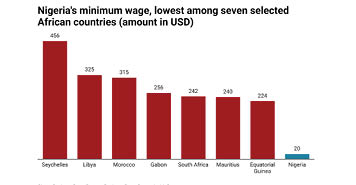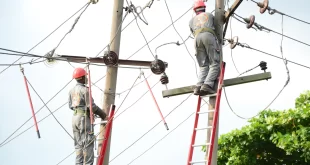
In Nigeria, the debate over the minimum wage has emerged as a critical junure that demands careful consideration and strategic planning. The impasse between labor unions advocating for higher wages and government authorities seeking economic stability reflects deeper societal issues that have far-reaching implications for the country’s future.
At the heart of this debate lies the well-being of Nigerian workers. As living costs soar and economic pressures mount, many hard-working individuals find themselves struggling to make ends meet on inadequate wages. This is not merely a financial issue but a question of dignity and basic livelihoods for those who form the backbone of our nation’s workforce.
The significance of this minimum wage impasse extends beyond individual paychecks. A fair and sustainable minimum wage is crucial for addressing poverty, reducing income inequality, and fostering social cohesion. By ensuring that workers receive just compensation, the government can stimulate consumer spending, drive economic growth, and pave the way for a more prosperous society that benefits all Nigerians.
However, finding a resolution to this impasse presents a complex challenge. Balancing the competing interests of workers and businesses while navigating the broader economic landscape requires thoughtful deliberation and a spirit of collaboration. Both labor unions and government officials must engage in constructive dialogue, prioritize the welfare of workers, and seek common ground to achieve a sustainable solution that serves the interests of all stakeholders.
As we stand at this crossroads in Nigeria’s economic trajectory, the path forward demands a delicate balancing act. Striking a harmonious balance between meeting the needs of workers and safeguarding the economic viability of businesses is essential for charting a path towards a more equitable and prosperous future for our nation.
Moreover, the outcome of the minimum wage debate will have ripple effects across various sectors of society. From education and healthcare to infrastructure and social services, a fair minimum wage can enhance the quality of life for Nigerians and drive inclusive growth that benefits the entire nation.
In light of these considerations, it is imperative for all stakeholders to rise above vested interests and partisan divides. Collaborative efforts, informed by data-driven decision-making and a commitment to long-term sustainability, are essential for steering Nigeria towards a future where economic prosperity is shared equitably among all citizens.
Ultimately, the future of Nigeria’s minimum wage debate holds profound implications for the nation’s development trajectory. By addressing this issue with foresight, compassion, and a commitment to social justice, we can lay the foundation for a more inclusive and prosperous Nigeria that upholds the dignity and well-being of every citizen. The ongoing debate surrounding Nigeria’s minimum wage has reached a critical juncture, forcing us to confront the stark reality of economic disparities and social injustices. At the heart of this discussion is not just a figure on a payslip but the very livelihoods and dignity of Nigerian workers who toil tirelessly to sustain our nation’s economy.
In a country where the cost of living continues to rise unabatedly, the need for a substantial increase in the minimum wage cannot be overstated. For many hardworking individuals, the current wages fall woefully short of meeting even the most basic needs, pushing them into a cycle of poverty and deprivation.
At its core, the minimum wage debate transcends mere economic considerations; it is a moral imperative that speaks to the fundamental values of fairness and equity in our society. The ability of a worker to earn a wage that enables them to live with dignity should not be up for negotiation but rather enshrined as a non-negotiable right.
As labor unions advocate for a higher minimum wage to provide a more sustainable standard of living for workers, the government faces the daunting task of balancing economic stability with the welfare of its citizens. This delicate equilibrium requires a nuanced approach that takes into account the multifaceted dimensions of the issue at hand.
The significance of a fair and adequate minimum wage extends far beyond the individual paycheck. It is a linchpin in the fight against poverty, a weapon against income inequality, and a catalyst for social cohesion. By ensuring that workers are fairly compensated for their labor, we pave the way for a more just and inclusive society.
Moreover, a higher minimum wage not only benefits individual workers but also has a ripple effect on the broader economy. When workers are paid fairly, they are more likely to contribute to local businesses, stimulate consumer spending, and drive economic growth. This virtuous of prosperity underscores the interconnectedness of wages, economic development, and societal well-being.
However, the implementation of a higher minimum wage is not without its challenges. Critics argue that raising wages could lead to job losses, inflationary pressures, and disruptions in certain industries. While these concerns are valid, they should not overshadow the imperative of uplifting the most vulnerable members of our workforce who are struggling to make ends meet.
To navigate these complexities, a collaborative approach involving government, business leaders, labor unions, and civil society is paramount. By engaging in constructive dialogue and finding common ground, stakeholders can work together to devise solutions that address the root causes of poverty and inequality while safeguarding the economic health of the nation.
In charting the future course of Nigeria’s minimum wage policy, we must strive for a balanced and sustainable approach that prioritizes social justice without compromising economic stability. This entails exploring innovative mechanisms such as productivity-based compensation, skills development programs, and social safety nets to ensure that all workers have access to decent and dignified livelihoods.
Ultimately, the minimum wage debate presents us with an opportunity to reaffirm our commitment to building a more inclusive and prosperous society for all Nigerians. By heeding the call for fair wages, we demonstrate our collective resolve to uphold the principles of fairness, equity, and solidarity that lie at the heart of a just society.
Certainly! Here are the next set of paragraphs to complete the opinion piece on Nigeria’s minimum wage debate: we not only uphold the principles of fairness and equity but also pave the way for sustainable economic growth and social cohesion. This moment in our nation’s history bold and visionary leadership that transcends short-term considerations and embraces a long-term vision of shared prosperity.
As we stand at the cross of policy reform, let us remember that the decisions we make today will shape the future trajectory of our society. It is incumbent upon policymakers, business leaders, and civil society advocates to rise above self-interest and partisan divides in pursuit of a common goal: a more just, equitable, and prosperous Nigeria for generations to come.
In conclusion, the minimum wage debate is not merely an economic issue but a moral imperative that speaks to the core values of our nation. By championing the cause of fair wages and dignified work, we can build a society where every individual has the opportunity to thrive and contribute to the collective well-being of our country. Let us seize this moment to chart a new course towards a brighter and more inclusive future for Nigeria.
 National Telescope national telescope newspaper
National Telescope national telescope newspaper




